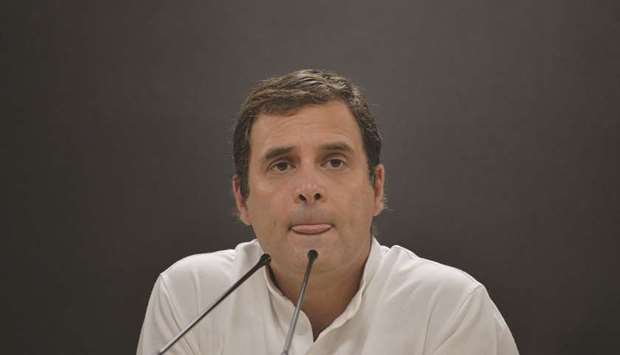Rahul Gandhi is set to face a backlash from within the main opposition Congress party after it suffered a mauling for a second general election in a row from Prime Minister Narendra Modi’s Hindu nationalist party.
The drubbing was so bad that Rahul himself lost the traditional family seat in Uttar Pradesh.
As vote-counting trends yesterday showed Modi’s Bharatiya Janata Party (BJP) winning more than 300 seats against just 49 for Congress, current and former party officials blamed a lacklustre campaign and a failure to overhaul its top team.
“If they want to change anything, change the leadership,” said a Congress official in Rajasthan, referring to the old guard around Rahul. “You need to give young people a chance.”
He was among five current and three former party officials who told Reuters that Rahul’s inability to jettison older leaders responsible for a major debacle in the 2014 general election and push forward newer, younger faces was a mistake.
All eight sources sought anonymity. Rahul’s office did not respond to a request from Reuters for an interview.
Still, the 48-year-old Rahul remains powerful within a party that has ruled the country for most of its history since independence from Britain in 1947, and is unlikely to face a leadership challenge immediately.
But Congress’s continued slide has raised questions both about its future and the role of his family.
Younger Indians find it difficult to accept that Rahul was appointed Congress president only because of his lineage as the son, grandson, and great-grandson of prime ministers, said prominent historian and columnist Ramachandra Guha.
“The Congress should dump the Dynasty,” he said on Twitter.
In May 2014, after Congress slumped to its worst performance in a general election, with 44 seats, Rahul told reporters: “There’s a lot for us to think about, and, as vice president of the party, I hold myself responsible.”
Five years on, his party has suffered a further beating at the hands of the BJP and he even lost the family borough of Amethi in northern Uttar Pradesh, though he won the second constituency from which he had contested, in Kerala.
The Congress also proved unable to effectively parry Modi’s campaign emphasis on national security, after aerial clashes and heightened tension with Pakistan following a suicide attack in Kashmir that killed 40 policemen.
At the end of last year, Congress’s hopes of upsetting Modi had increased, after it won three heartland states in elections, largely driven by voter concerns about weak farm incomes and a lack of jobs.
But Congress fumbled communications on key policies, with a publicity campaign this year that escaped the notice even of some of its own workers, and failed to forge pre-election alliances in key states, said the party officials who spoke to Reuters.
The campaign was substantially delayed because of disagreements between 66-year-old Anand Sharma and other senior leaders, two party officials said.
Sharma denied the accusation, saying that putting together the campaign was a complex process. “There was no delay whatsoever in the launch of Congress campaign,” he added.
The campaign was launched on April 7, just four days before the first round of voting began in a general election spread over seven phases across 39 days.
In Rajasthan, which Congress won last year, its choice of 68-year-old Ashok Gehlot as chief minister, instead of 41-year-old Sachin Pilot, backfired, losing it the support of a key caste grouping, the official said, leaving the BJP likely to sweep all 25 seats.
Rahul was encircled by a “college of sycophants”, said a former Congress official who joined a rival bloc this year. “It doesn’t matter if you have talent or merit,” the former official said, adding, “what matters is you have the right family name or the right mentor.”
In contrast to Modi, a tea vendor’s son who rose through party ranks, Rahul’s lineage is a weakness the prime minister has repeatedly exploited.
In Uttar Pradesh, which elects the bulk of lawmakers, Congress this year drafted in Rahul’s charismatic sister, Priyanka Gandhi Vadra, to burnish its fortunes. But that made little difference to results.
Resignation issue ‘between me, working committee’
Congress president Rahul Gandhi yesterday took full responsibility for the defeat of the party in the Lok Sabha elections and said the issue of his resignation was a matter between him and the Congress Working Committee. “I accept full responsibility (for the party’s performance),” Rahul said at a press conference in New Delhi. Party leaders said reports of Rahul offering to resign were “mischievous and incorrect”. Rahul also responded to the question at a press conference addressed by him. “We will have a meeting of the working committee. That you can leave between me and the working committee,” he said when asked if he would resign. The Congress is poised to win 51 seats in the Lok Sabha polls, only seven seats more than the seats it won in 2014 Lok Sabha elections. Rahul led the party’s campaign in the elections.
Meanwhile, Rahul won Kerala’s Wayanad seat – the second seat he contested in the 2019 polls – with a record margin of 431,770 votes. Rahul defeated his nearest rival P P Suneer of the Communist Party of India who secured 274,597 votes, while Rahul got 706,367 votes. This margin of victory is the highest in the state for any Lok Sabha constituency. Former chief minister Oommen Chandy, who was the first person to announce the candidature of Gandhi expressed happiness at the huge victory. “This result was a foregone conclusion , as right from the day his name was announced, we could sense that the people in Wayanad had accepted him. His visits to the constituency... first when he came to file his nomination and then for a day’s campaign, really made every Congress worker excited,” said Chandy.

Rahul Gandhi
